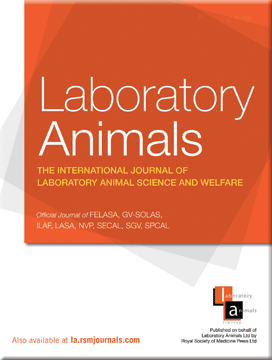
LABORATORY ANIMALS
Scope & Guideline
Advancing ethical standards in laboratory animal science.
Introduction
Aims and Scopes
- Ethical considerations in animal research:
The journal emphasizes the importance of ethical practices in laboratory animal research, advocating for the 3Rs principles: Replacement, Reduction, and Refinement. It encourages researchers to consider humane alternatives and improve animal welfare. - Methodological advancements:
A core focus of the journal is to publish studies that contribute to innovative methodologies in laboratory animal science. This includes statistical methods, experimental designs, and techniques aimed at improving the reliability and reproducibility of research outcomes. - Animal welfare and care:
Research on the welfare of laboratory animals is a significant area of interest. The journal publishes articles that assess and propose enhancements to the care, housing, and handling of laboratory animals to ensure their well-being. - Diverse species utilization:
The journal covers a wide range of laboratory animal species, including rodents, fish, and non-human primates, reflecting the diversity of animal models used in research. This includes studies on specific species' biology, health, and welfare. - Interdisciplinary approaches:
The journal promotes interdisciplinary research that integrates various fields such as veterinary science, behavioral science, and biostatistics to enhance laboratory animal research quality and outcomes.
Trending and Emerging
- Statistical power and experimental design:
There is an increasing focus on the importance of statistical power and robust experimental design. Recent papers emphasize the need for proper statistical methodologies to enhance the reliability and validity of research findings. - Non-invasive and refined techniques:
Emerging research trends include non-invasive methods for data collection and refined techniques that minimize animal discomfort. This reflects a growing commitment to animal welfare and ethical research practices. - Interdisciplinary collaborations:
An increase in interdisciplinary research approaches is evident, with studies integrating insights from fields such as biostatistics, veterinary science, and behavioral studies to improve overall research quality. - Technology-enhanced monitoring:
The use of advanced technologies, including automated monitoring systems and imaging techniques, is gaining traction. These innovations aim to enhance animal welfare and provide more accurate data for research. - Focus on mental well-being of animal care staff:
Recent publications reflect a growing awareness of the mental well-being of personnel involved in laboratory animal care. This trend highlights the importance of support systems and workplace culture in promoting ethical practices.
Declining or Waning
- Traditional animal models for specific diseases:
There has been a noticeable decrease in studies focusing on traditional animal models for specific diseases, possibly due to the rise of alternative models and methods that better align with the 3Rs principles. - Basic anatomical studies:
Research centered solely on basic anatomy without a clear application to welfare or experimental outcomes is becoming less common, as the journal shifts towards more applied and translational research. - Generalized welfare assessments:
Previous trends of generalized animal welfare assessments are declining, with a growing focus on more specific, targeted interventions and evaluations that provide actionable insights into animal care. - Over-reliance on historical data:
The use of historical data without rigorous methodological updates or contextual relevance is diminishing, as the journal encourages more contemporary and methodologically sound approaches to research. - Single-species studies:
There is a waning emphasis on studies that focus exclusively on a single species without considering broader implications or comparative insights across species.
Similar Journals

SCANDINAVIAN JOURNAL OF LABORATORY ANIMAL SCIENCE
Fostering Knowledge for a Better Scientific FutureSCANDINAVIAN JOURNAL OF LABORATORY ANIMAL SCIENCE, published by the Scandinavian Society of Laboratory Animal Science, serves as a critical resource for researchers and professionals in the fields of veterinary science, animal biology, and biochemistry. Since its inception in 1996, this journal has consistently aimed to advance the understanding and welfare of laboratory animals through rigorous scientific research and innovative methodologies. Although it currently holds a Q4 ranking in several categories, including Animal Science and Zoology, it remains an essential platform for disseminating findings that influence both ethical practices and scientific advancements. The journal has converged its publishing years from 1996 to 2012 and 2014 to 2024, reflecting its commitment to ongoing research discourse. While it does not offer open access, the content within promises to deliver invaluable insights to enhance the quality of laboratory practices. Situated in Denmark, the journal invites contributions that foster a better understanding of the complexities of laboratory animal science, ensuring relevance and significant impact within the global scientific community.

Medycyna Weterynaryjna-Veterinary Medicine-Science and Practice
Innovating Animal Health Through Science and PracticeMedycyna Weterynaryjna-Veterinary Medicine-Science and Practice, published by the Polish Society of Veterinary Sciences Editorial Office, stands as a significant contributor to the field of veterinary medicine, focusing on various aspects of animal health and clinical practice. Established in 1945, this journal has continuously evolved, embracing the latest developments in veterinary science, making it an essential resource for researchers, professionals, and students alike. With an ISSN of 0025-8628, it is indexed in Scopus, currently ranked in the 22nd percentile within the Veterinary category, and has accordingly been placed in Q4 of the category quartiles as of 2023, reflecting its niche yet vital contributions to the field. Although currently not open access, the journal’s value is underscored by its dedication to disseminating scientific knowledge and advancements that enhance animal health and welfare in Poland and beyond. The editorial office is located in Lublin, Poland, serving as a hub for veterinary professionals seeking to publish and stay updated on contemporary issues in veterinary practice.

Journal of Veterinary Science
Advancing Veterinary Knowledge, One Study at a Time.Journal of Veterinary Science, published by the Korean Society of Veterinary Science, is a distinguished peer-reviewed Open Access journal that has been contributing to the field of veterinary medicine since its inception in 2000. With an E-ISSN of 1976-555X, this journal not only provides critical insights for researchers globally but also maintains a strong presence within the academic community, evidenced by its impressive ranking in the Scopus database, where it stands at 44 out of 194 in the general veterinary category, placing it in the 77th percentile. The journal’s impact factor reflects its rigorous standards and the significance of the research it publishes, all while offering unrestricted access to its content since 2006, which promotes the free exchange of knowledge. Situated in the vibrant academic atmosphere of Seoul, South Korea, the Journal of Veterinary Science aims to advance veterinary research and practice, covering a broad spectrum of topics to inspire students, professionals, and established researchers alike to push the boundaries of veterinary science.
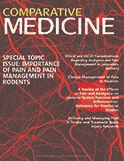
COMPARATIVE MEDICINE
Bridging disciplines for a healthier tomorrow.Comparative Medicine, published by the American Association for Laboratory Animal Science, serves as a vital resource in the fields of veterinary science and biochemistry, focusing on the complexities of laboratory animal research and its implications for human and animal health. Established in 2000 and continuing through 2024, this journal has cultivated a reputation for disseminating innovative research and reviews that enhance understanding of comparative biology and medicine. With a commendable Q3 rank in both Biochemistry, Genetics and Molecular Biology and Medicine, and a notable Q2 rank in Veterinary sciences as of 2023, it stands out in its field. The journal is dedicated to open access, aligning with contemporary trends in scientific communication, and its impact can be appreciated in its Scopus ranks, placing it in the 59th percentile for General Veterinary and the 36th percentile for General Biochemistry, Genetics, and Molecular Biology. Researchers, professionals, and students will find this journal indispensable for staying informed on cutting-edge advancements and fostering cross-disciplinary dialogue in comparative medicine.
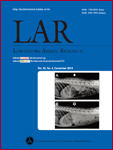
Laboratory Animal Research
Pioneering open access to transformative research.Laboratory Animal Research is a prominent academic journal dedicated to advancing the field of laboratory animal science, providing a platform for researchers, professionals, and students focused on biochemistry, genetics, and molecular biology. Published by SPRINGERNATURE, this journal is recognized for its rigorous peer-review process and commitment to high-quality research, achieving a notable Q2 ranking in the Biochemistry, Genetics and Molecular Biology category as of 2023. Since becoming an Open Access journal in 2015, Laboratory Animal Research has fostered greater accessibility and dissemination of research findings, encouraging collaboration and innovation within the scientific community. With its ISSN 1738-6055 and E-ISSN 2233-7660, the journal is based in the United Kingdom and resides at CAMPUS, 4 Crinan St, London, N1 9XW, England. It is an essential resource for anyone involved in laboratory animal research and strives to enhance the welfare and scientific use of animals in research settings.

ATLA-ALTERNATIVES TO LABORATORY ANIMALS
Pioneering the future of laboratory research without the use of animals.ATLA-Alternatives to Laboratory Animals is a pivotal journal in the field of laboratory animal science and alternatives research, published by SAGE Publications Ltd. With an ISSN of 0261-1929 and an E-ISSN of 2632-3559, this esteemed publication provides an essential platform for the dissemination of innovative methodologies that seek to reduce, refine, and replace the use of animal testing in research. The journal is committed to advancing ethical standards in scientific practices by showcasing studies and reviews that reinforce the principles of the 3Rs. It currently holds a respected position within various quartile rankings, including Q2 in Medical Laboratory Technology, reflecting its influence within the research community. Researchers and professionals can access its comprehensive range of articles bolstering the conversation around humane research practices without the burden of open access fees. With its dedicated focus since its inception in 1982, ATLA continues to be a cornerstone resource for those aiming to enhance both scientific and ethical standards in laboratory research.

IRISH VETERINARY JOURNAL
Connecting research and practice in veterinary excellence.IRISH VETERINARY JOURNAL is a premier open-access publication in the field of veterinary science, established to disseminate high-quality research and innovations that advance the veterinary profession and animal health. Published by BMC since 2004, this journal not only ensures worldwide access to cutting-edge findings but also maintains an impressive ranking as Q1 in the Veterinary (miscellaneous) category according to the 2023 metrics, highlighting its significance and influence. With an impressive Scopus rank of #19/194 and a 90th percentile placement, it provides a robust platform for researchers, professionals, and students alike to engage with the latest studies, reviews, and case reports. The journal's coverage spans from its inception in 1973 to the present, catering to a diverse audience interested in various aspects of veterinary science, ensuring that it remains an essential resource for those passionate about the welfare of animals and the advancement of veterinary practices.

Porcine Health Management
Elevating swine welfare through impactful research.Porcine Health Management is an esteemed open-access journal published by BMC, focusing on the critical intersection of veterinary science and animal husbandry with a particular emphasis on swine health. Since its inception in 2015, the journal has established itself as a leading platform for disseminating cutting-edge research, earning a prominent position in the field with a 2023 category ranking of Q1 in Animal Science and Zoology, Food Animals, and Small Animals. With a strong impact factor indicative of its quality and relevance, the journal serves as an essential resource for researchers, practitioners, and students dedicated to advancing knowledge in swine health management. It is hosted in the United Kingdom and operates under transparent open-access guidelines, providing broad accessibility to vital research findings that drive innovation in animal health practices. As the field continues to evolve, Porcine Health Management remains at the forefront, contributing to the welfare and productivity of food animals.
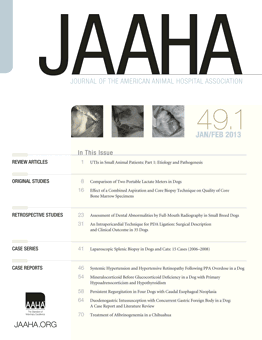
JOURNAL OF THE AMERICAN ANIMAL HOSPITAL ASSOCIATION
Elevating standards in veterinary medicine with cutting-edge insights.JOURNAL OF THE AMERICAN ANIMAL HOSPITAL ASSOCIATION (ISSN: 0587-2871, E-ISSN: 1547-3317), published by the American Animal Hospital Association, is a premier resource for veterinary professionals, researchers, and students focusing on the field of veterinary medicine. Established in 1973, this esteemed journal serves as a vital platform for disseminating cutting-edge research and clinical insights in the management and care of small animals, boasting a remarkable Q1 ranking in Small Animals and a Q2 ranking in Medicine (miscellaneous), reflecting its high impact in the field. With a Scopus rank of #6 in the veterinary small animals category and a 72nd percentile standing, it offers valuable content covering a diverse range of topics pertinent to animal health and welfare. Although not open access, the journal provides essential resources that contribute significantly to the ongoing professional development of veterinary practitioners and the broader scientific community, thus solidifying its status as a cornerstone of veterinary literature.
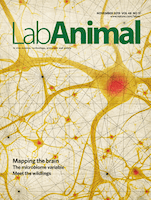
LAB ANIMAL
Exploring innovative solutions for animal welfare and research.LAB ANIMAL, a journal published by NATURE PORTFOLIO, is a prominent source of knowledge in the fields of animal science and veterinary medicine. With its ISSN 0093-7355 and E-ISSN 1548-4475, it serves as a critical platform for researchers, professionals, and students dedicated to the advancement of laboratory animal science. Despite being categorized in the Q4 quartile for Animal Science and Zoology and Q3 for Veterinary (Miscellaneous) in 2023, its contributions are invaluable, reflecting rigorous research and development essential for improving laboratory animal care and ethical research practices. The journal aims to foster innovation and responsive dialogue in an evolving landscape of animal research, promoting a more humane and scientifically sound approach. Although it currently operates under a subscription-based model, LAB ANIMAL continues to be an essential resource for the academic community, providing insights that are integral to advancing both veterinary and animal sciences. The journal has consistently published research since its inception in 1995, engaging a diverse audience with comprehensive studies and discussions that impact the future of the field.